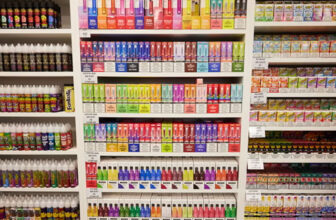
France aims to prohibit the sale of disposable vaping products known as "puffs" across the country. This policy forms part of a large-scale government initiative to curb smoking rates, especially among youth. Let's explore France's vape crackdown and how other nations try addressing similar addiction concerns.
Why France Plans to Ban Disposable Vape Sales
During a recent broadcast interview, Prime Minister Élisabeth Borne announced imminent rules banning disposable vape sales domestically. This urgent action directly targets vape devices with high nicotine concentrations and flavors potentially attracting teenagers.
Borne worries the current disposable vape market enabled by manufacturers hooks young users on nicotine addiction through flavors reminiscent of childhood candies. Bright packaging and pricing around €8 further aid accessibility and appeal. With over 75,000 French smoking-related deaths annually, officials believe prohibiting disposable vape distribution can deter youth uptake while limiting health risks.
The French government confirmed finalizing its comprehensive 2024 anti-smoking budget including the disposable vape ban. Rules will forbid domestic importing, manufacturing, marketing and sales channels. However Borne ruled out additional cigarette tax increases for now. The main aim is stopping irresponsible players within the vaping industry from exploiting adolescents.
How Do Other European Countries Regulate Disposable Vapes?
Acknowledging the complex balancing act between smoking cessation tools and youth addiction pathways, France analyzed regulatory approaches across Europe to craft its disposable vape response:
Belgium - Currently bans all online advertising and sales of disposable vape products with fines up to €1000 for violations. But lacks comprehensive offline channel oversight.
Germany - Started prohibiting flavored heated tobacco goods expected to appeal more to novice users versus traditional adult smokers. Limits advertising venues.
Ireland - An intensive consultation assessing potential impacts of instituting a national disposable vape ban underway based on public health data.
EU - Pushing for bolder warning label requirements on packaging for vapes and e-cigarettes alongside marketing constraints to disincentivize youth appeal.
These examples showcase member states acknowledging disposable vape risks but taking different tangible actions against marketing and distribution. France synthesizes many to enact swift comprehensive legislation covering both online and retail acquisition channels.
Disposable Vape Bans and Restrictions Worldwide
Beyond European countries, we see an international push to answer regulatory questions posed by vapes through various models:
Australia - Instituted far-reaching rules making nearly all vape products prescription-only while limiting flavors and nicotine levels permitted in approved vapes.
New Zealand - Banned most disposable vape imports and sales near schools. Enforced stricter generic marketing language and product descriptions.
United States - Individual states passed sweeping flavor bans and prohibitions on major manufacturers like Juul to curb youth surges. Federal pressure on vape makers to demonstrate safety rising.
Asia - Nations like Thailand, Singapore and India implemented comprehensive vape sales and usage bans entirely. Malaysia however now taxes and permits vape sales after ineffective blanket prohibition.
These examples indicate two overall regulatory schools of thought emerging worldwide:
- Institute Complete Bans - Prevent all manufacturing and sales channels for vapes regardless of type.
- Permit but Restrict - Allow vape commerce but impose guardrails like bans on models assessed as higher youth risk.
France aligns more with the second stream through prohibiting disposable vapes specifically while keeping other regulated options temporarily available for adult smokers. But officials hinted they may reassess if youth vaping rates fail to decline.
French Government Prioritizes Preparing Additional Tobacco Legislation
Alongside firming up the disposable vape import and sales ban, Prime Minister Borne stressed parliament still intends preparing supplementary anti-smoking laws before year end despite lacking a governing majority. Borne confirmed leaders already collaborating across party lines to fast track appropriate vaping and tobacco rules focused on public health.
While unable to yet share details, Borne said the laws aim protecting children from predatory marketing in all forms. Reports suggest proposals may include further constraints on vape promotions, packaging standards, retail licenses, and manufacturing oversight.
Officials still finalize budget particulars but France clearly acknowledges the disposable vape ban constitutes initial urgent action in a much larger mission to prevent youth smoking and vaping addiction. All policies undergo careful balance against adult smoker needs but emerging evidence shows countries worldwide must address new nicotine threats targeting adolescents. France moves decisively to get ahead of this rising epidemic.







